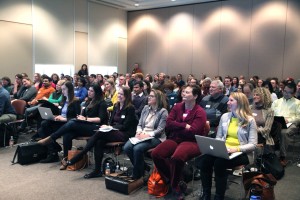 Thanks to a generous Idea Grant from the National Association of Science Writers, DCSWA was able to provide scholarships to a team of writers to document Professional Development Day 2015. Read on for writeups of all sessions except the pitch slam, and for links to tweets from selected sessions.
Thanks to a generous Idea Grant from the National Association of Science Writers, DCSWA was able to provide scholarships to a team of writers to document Professional Development Day 2015. Read on for writeups of all sessions except the pitch slam, and for links to tweets from selected sessions.
Plenary talk: Keeping it real with Joel Achenbach
By Sarah Hansen
It took an invitation to speak at DCSWA’s Professional Development Day for Joel Achenbach to consider himself a “real” science writer, notwithstanding decades of accolades for writing about an array of scientific topics. Despite his recent initiation into our ranks, Achenbach shared powerful advice focused on making science comprehensible for our audiences, and he elicited plenty of laughs along the way.
Read more…
Read Christina Szalinski’s tweets from this talk
Breakout session: Skillful storytellers use elements of fiction to tell the truth
By Allison Opitz
Science writing relies heavily on methods of both fiction and journalism—a delicate combination of literary techniques combined with the factual nature of journalism. A writer should engage the reader by creating characters, conflict, setting, dialogue, and telling details, but with one caveat: It all has to be true. This caution came from author Richard Panek, one of three panelists making up the “Secrets from Skillful Storytellers” session at DCSWA’s 2015 Professional Development Day in Washington, D.C.
Breakout session: The fine art of developing and pitching stories
By Kristin Kokal
During the first breakout session of DCSWA’s Professional Development Day, editors from Science and Smithsonian magazines and two freelance writers discussed the art of developing and pitching science stories. Each panelist mined his or her experience to provide critical do’s and don’ts to aspiring freelancers.
Breakout session: Ebola: A case study
Blog post by Arvind Suresh
The recent Ebola epidemic in West Africa, and the virus’s spread to the U.S., sent the American news media into a state of collective frenzy and spawned thousands of news stories. As a science writer, it was hard not to notice that there was a tremendous amount of misinformation to be found at every corner. I was forced to ask myself, what is the best way to communicate in this environment?
Read more…
Read Dami Akinmade’s tweets from this session
Plenary talk: NPR’s Christopher Joyce on the past, present and future of oral storytelling
By Joy Ng
DCSWA is an organization of talented science communicators who take jargon-ridden science research and transform it into something comprehensible and compelling. A communicator’s tool of choice can vary among written words, sounds and images. As communicators, we know that with whichever medium we choose, it is the stories we tell that connect with people. Stories are full of “ah hah, I get it!” moments, leaving readers, listeners or watchers with a resounding sense of satisfaction.
Read more and hear Joy’s podcast…
Read Kristan Uhlenbrock’s tweets from this session
Breakout session: Finding funds for international reporting
By Linnea Bennett
Many journalists picture an international reporting trip as a time to type prose in a Parisian café or scribble notes in the shadow of the Taj Mahal. But the topics that international reporters cover often lead them to much more rugged terrain—imagine covering conflict in sub-Saharan Africa or climate change in Vanuatu.
Breakout session: Freelance finance
By Teal Burrell
A few years after writing his first book, Michael Chorost “felt the squeeze.” He was freelancing for magazines and had received a decent advance on a second book, but still, he remembers, “It was tough to make ends meet.” He had no choice but to do what he knew was a bad idea: He dipped into his IRA to pay the rent.
Breakout session: Upping your editing game
By Alexandra Branscombe
An editor works behind the scenes, taking all of the blame but none of the credit. This is one of the many characteristics of a good editor, according to a panel of experienced science editors at the DCSWA 2015 Professional Development Day session “Upping Your Editing Game.” The panel gave tips and best-practice advice to both new and experienced editors.
Read more…
Read Megan Pauly’s tweets from this session
Breakout session: The state of science book writing in 2015
By Mollie Rappe
From the joy of seeing their books sitting on the shelf to the drudgery of writing 1,000 words each day, no matter what, four authors—panelists John McQuaid, Kimberly Stephens, and Matthew Shaer, along with moderator Michael Chorost—dissected the process of getting a science book published in 2015. Topics ranged from time and money considerations to the rewards of writing a book and the writer-agent relationship.
Breakout session: Sci-Mation: Animations worth more than a thousand words
By Tashiana Osborne
Have you ever been stumped while trying to explain a complicated concept to someone? Maybe it was something within your specific niche, or maybe it was something you yourself had spent hours researching to better understand?
Session descriptions assigned and edited by Gabriel Popkin.

Sorry, comments are closed for this post.